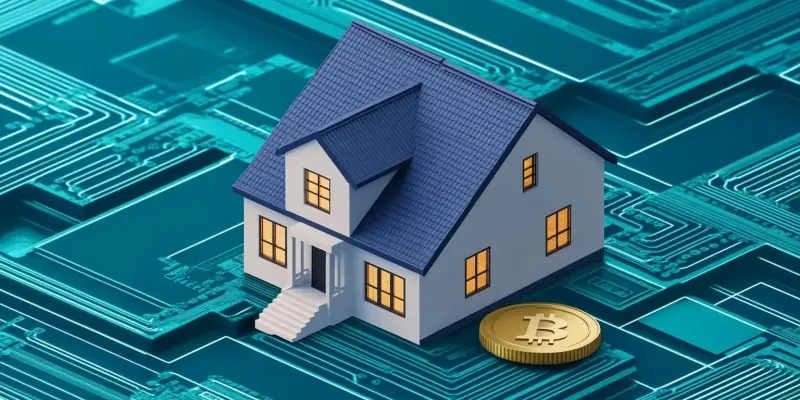Blockchain technology is set to revolutionize the real estate market, introducing new avenues for investment by digitizing real-world assets (RWAs) and leveraging the power of tokenization. An ambitious $1 billion initiative by Dubai’s Damac Properties and the Mantra protocol aims to make these changes tangible. Amira Sajwani of Damac Properties and John Patrick Mullin of Mantra envision a future where real estate is more accessible, transparent, and efficient. The misconceptions linking tokenization to cryptocurrency volatility need to be dispelled, and this initiative is doing just that, showing the stability and value that tokenized real estate can offer.
Tokenization Lowers the Barrier to Entry
Fractional Ownership and Rental Yields
The integration of blockchain technology in real estate significantly lowers the barrier to entry for investors by enabling fractional ownership. Unlike other asset classes such as gold, real estate offers the continuous benefit of rental yields, making it an attractive proposition for tokenization. By breaking down large properties into smaller, tradable fractions, more investors can participate in the market without needing to commit substantial capital upfront. This democratization of property investment means that individuals who previously found real estate unattainable can now invest in parts of properties and earn proportionate rental income, increasing their financial inclusion.
Furthermore, fractional ownership provides liquidity to what has traditionally been an illiquid asset class. Investors can easily buy, sell, or trade their property tokens on secondary markets, ensuring they have access to their funds when needed. This liquidity encourages more participation and enhances the overall efficiency of the market. The focus of the initiative is on making real estate investment more transparent, efficient, and accessible. Blockchain technology ensures that all transactions are recorded on a public ledger, reducing the risk of fraud and enhancing trust among market participants.
Stability and Market Confidence
One of the key benefits of tokenized real estate is its inherent stability compared to the volatile nature of cryptocurrencies. Amira Sajwani of Damac Properties stresses that the value of tokenized assets comes from the physical properties themselves, providing a solid basis for their worth. This fundamental difference dispels the misconception that tokenization is synonymous with the unpredictable swings seen in the crypto market. By backing tokens with real, tangible assets, investors can have greater confidence in the stability and value of their investments.
The potential market growth for tokenized real estate is vast. John Patrick Mullin of Mantra believes that, despite being in its infancy, the market could expand from billions to trillions of dollars. This growth is contingent on several factors, including robust market participants, continuous innovation, and regulatory clarity. As more players enter the market and bring innovative solutions, the ecosystem will mature, attracting even more investors. Regulatory support is crucial in this context to ensure a secure and trustworthy environment for all stakeholders involved, fostering long-term sustainability and growth.
Global Trends and Transformation
Democratizing Access and Enhancing Transparency
As Dubai pioneers this digital transformation, blockchain-powered real estate is on its way to becoming the standard, opening up new investment avenues worldwide. The overarching trend is to integrate blockchain with real estate to democratize access and enhance market transparency. By making detailed property information available on a public ledger, blockchain technology tackles one of the biggest challenges in real estate – the lack of transparency. Potential investors can verify ownership, transaction history, and property details, significantly reducing the risk of fraud and misinformation.
This increased transparency benefits not only investors but also other stakeholders such as regulators, lenders, and governments. The ability to quickly and accurately access information ensures compliance with regulatory requirements and enhances the overall trust in the real estate ecosystem. The enhanced transparency also facilitates better decision-making, as investors have access to comprehensive data, enabling them to make informed choices. This shift towards a more transparent and inclusive market marks a significant step forward for the industry and sets a new benchmark for real estate transactions globally.
Collaboration, Regulation, and Technological Advancements
Blockchain technology is poised to transform the real estate industry by opening up new investment opportunities through the digitization of real-world assets (RWAs) and the use of tokenization. A groundbreaking $1 billion project led by Dubai’s Damac Properties in collaboration with the Mantra protocol is set to actualize these changes. Amira Sajwani of Damac Properties and John Patrick Mullin of Mantra foresee a future where real estate becomes more accessible, transparent, and efficient for investors. One of the primary goals of this initiative is to clear up misunderstandings that equate tokenization with the volatility of cryptocurrencies. By doing so, it aims to highlight the stability and enduring value that tokenized real estate can provide. The project underscores the broader potential of blockchain technology to innovate traditional markets and presents a compelling case for how digital transformation can enhance the real estate sector’s appeal and functionality, ultimately benefiting a wider range of investors.

